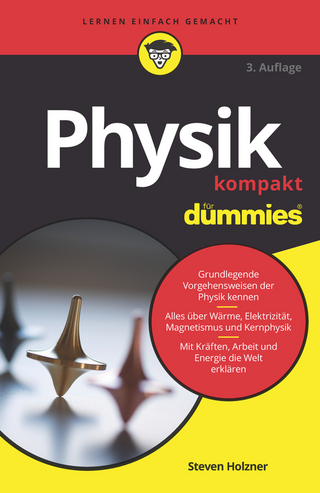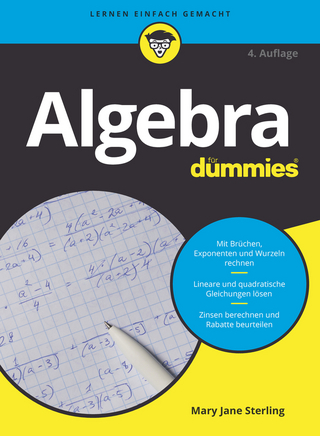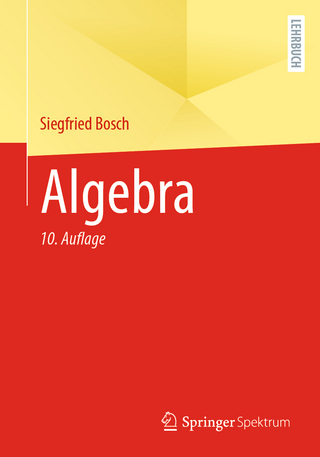
Galois Theory
Chapman & Hall/CRC (Verlag)
978-1-032-10159-0 (ISBN)
Since 1973, Galois theory has been educating undergraduate students on Galois groups and classical Galois theory. In Galois Theory, Fifth Edition, mathematician and popular science author Ian Stewart updates this well-established textbook for today’s algebra students.
New to the Fifth Edition
Reorganised and revised Chapters 7 and 13
New exercises and examples
Expanded, updated references
Further historical material on figures besides Galois: Omar Khayyam, Vandermonde, Ruffini, and Abel
A new final chapter discussing other directions in which Galois theory has developed: the inverse Galois problem, differential Galois theory, and a (very) brief introduction to p-adic Galois representations
This bestseller continues to deliver a rigorous, yet engaging, treatment of the subject while keeping pace with current educational requirements. More than 200 exercises and a wealth of historical notes augment the proofs, formulas, and theorems.
Ian Stewart is an emeritus professor of mathematics at the University of Warwick and a fellow of the Royal Society. Dr. Stewart has been a recipient of many honors, including the Royal Society’s Faraday Medal, the IMA Gold Medal, the AAAS Public Understanding of Science and Technology Award, and the LMS/IMA Zeeman Medal. He has published more than 210 scientific papers and numerous books, including several bestsellers co-authored with Terry Pratchett and Jack Cohen that combine fantasy with nonfiction.
1. Classical Algebra. 1.1. Complex Numbers. 1.2. Subfields and Subrings of the Complex Numbers. 1.3. Solving Equations. 1.4. Solution by Radicals. 2. The Fundamental Theorem of Algebra. 2.1. Polynomials. 2.2. Fundamental Theorem of Algebra. 2.3. Implications 3. Factorisation of Polynomials. 3.1. The Euclidean Algorithm. 3.2 Irreducibility. 3.3. Gauss’s Lemma. 3.4. Eisenstein’s Criterion. 3.5. Reduction Modulo p. 3.6. Zeros of Polynomials. 4. Field Extensions. 4.1. Field Extensions. 4.2. Rational Expressions. 4.3. Simple Extensions. 5. Simple Extensions. 5.1. Algebraic and Transcendental Extensions. 5.2. The Minimal Polynomial. 5.3. Simple Algebraic Extensions. 5.4. Classifying Simple Extensions. 6. The Degree of an Extension. 6.1. Definition of the Degree. 6.2. The Tower Law. 6.3. Primitive Element Theorem. 7. Ruler-and-Compass Constructions. 7.1. Approximate Constructions and More General Instruments. 7.2. Constructions in C. 7.3. Specific Constructions. 7.4. Impossibility Proofs. 7.5. Construction From a Given Set of Points. 8. The Idea Behind Galois Theory. 8.1. A First Look at Galois Theory. 8.2. Galois Groups According to Galois. 8.3. How to Use the Galois Group. 8.4. The Abstract Setting. 8.5. Polynomials and Extensions. 8.6. The Galois Correspondence. 8.7. Diet Galois. 8.8. Natural Irrationalities. 9. Normality and Separability. 9.1. Splitting Fields. 9.2. Normality. 9.3. Separability. 10. Counting Principles. 10.1. Linear Independence of Monomorphisms. 11. Field Automorphisms. 11.1. K-Monomorphisms. 11.2. Normal Closures. 12. The Galois Correspondence. 12.1. The Fundamental Theorem of Galois Theory. 13. Worked Examples. 13.1. Examples of Galois Groups. 13.2. Discussion. 14. Solubility and Simplicity. 14.1. Soluble Groups. 14.2. Simple Groups. 14.3. Cauchy’s Theorem. 15. Solution by Radicals. 15.1. Radical Extensions. 15.2. An Insoluble Quintic. 15.3. Other Methods. 16. Abstract Rings and Fields. 16.1. Rings and Fields. 16.2. General Properties of Rings and Fields. 16.3. Polynomials Over General Rings. 16.4. The Characteristic of a Field. 16.5. Integral Domains. 17. Abstract Field Extensions and Galois Groups. 17.1. Minimal Polynomials. 17.2. Simple Algebraic Extensions. 17.3. Splitting Fields. 17.4. Normality. 17.5. Separability. 17.6. Galois Theory for Abstract Fields. 17.7. Conjugates and Minimal Polynomials. 17.8. The Primitive Element Theorem. 17.9. Algebraic Closure of a Field. 18. The General Polynomial Equation. 18.1. Transcendence Degree. 18.2. Elementary Symmetric Polynomials. 18.3. The General Polynomial. 18.5. Solving Equations of Degree Four or Less. 18.6. Explicit Formulas. 19. Finite Fields. 19.1. Structure of Finite Fields. 19.2. The Multiplicative Group. 19.3. Counterexample to the Primitive Element Theorem. 19.4. Application to Solitaire. 20. Regular Polygons. 20.1. What Euclid Knew. 20.2. Which Constructions are Possible? 20.3. Regular Polygons. 20.4. Fermat Numbers. 20.5. How to Construct a Regular 17-gon. 21. Circle Division. 21.1. Genuine Radicals. 21.2. Fifth Roots Revisited. 21.3. Vandermonde Revisited. 21.4. The General Case. 21.5. Cyclotomic Polynomials. 21.6. Galois Group of Q(ζ)= Q. 21.7. Constructions Using a Trisector. 22. Calculating Galois Groups. 22.1. Transitive Subgroups. 22.2. Bare Hands on the Cubic. 22.3. The Discriminant. 22.4. General Algorithm for the Galois Group. 23. Algebraically Closed Fields. 23.1. Ordered Fields and Their Extensions. 23.2. Sylow’s Theorem. 23.3. The Algebraic Proof. 24. Transcendental Numbers. 24.1. Irrationality. 24.2. Transcendence of e. 24.3. Transcendence of π. 25. What Did Galois Do or Know? 25.1. List of the Relevant Material. 25.2. The First Memoir. 25.3. What Galois Proved. 25.4. What is Galois Up To? 25.5. Alternating Groups, Especially A5. 25.6. Simple Groups Known to Galois. 25.7. Speculations about Proofs. 25.8. A5 is Unique. 26. Further Directions. 26.1. Inverse Galois Problem. 26.2. Differential Galois Theory. 26.3. p-adic Numbers.
| Erscheinungsdatum | 19.08.2022 |
|---|---|
| Zusatzinfo | 38 Line drawings, black and white; 38 Illustrations, black and white |
| Sprache | englisch |
| Maße | 156 x 234 mm |
| Gewicht | 526 g |
| Themenwelt | Mathematik / Informatik ► Mathematik ► Algebra |
| Mathematik / Informatik ► Mathematik ► Arithmetik / Zahlentheorie | |
| ISBN-10 | 1-032-10159-8 / 1032101598 |
| ISBN-13 | 978-1-032-10159-0 / 9781032101590 |
| Zustand | Neuware |
| Haben Sie eine Frage zum Produkt? |
aus dem Bereich


